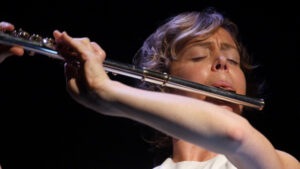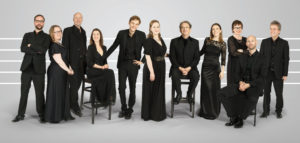
Ironically, the first concert of flutist Claire Chase’s reign as Richard and Barbara Debs Creative Chair at Carnegie Hall in the 2022-23 season focuses on a dead composer. In honor of the groundbreaking composer and accordionist Pauline Oliveros (1932-2016), on January 21, 2023 Chase and friends perform an all-Oliveros concert. In addition to Chase (credited as performing “air objects”), instrumentalists include percussionists Tyshawn Sorey and Susie Ibarra and Manari Ushigua, leader of the Sapara Nation in the Ecuadorian Amazon, who has the intriguing credit of “Forest Wisdom Defender”.
Oliveros was hugely influential on the contemporary music scene. She was especially noted for “deep listening,” a term that Oliveros herself coined, referring to an aesthetic based upon principles of improvisation, electronic music, ritual, teaching and meditation.
The performance will be in Zankel Hall, reconfigured to a theater-in-the-round setup with the performers in the center of the hall. Several other contemporary music program in January will take place in the “Zankel Hall Center Stage” milieu, including performances by yMusic (January 19), Third Coast Percussion (January 20), Rhiannon Giddens (January 24) and Kronos Quartet (January 27).
“I’m honored to be the 2022-2023 Richard and Barbara Debs Creative Chair at Carnegie Hall this season,” wrote Chase on Facebook. “Each of the projects on this series has collaboration at its core, and I’m gobsmacked to get to share the stage with some of the most inspiring musicians in my orbit—people who have changed the way I play, changed the way I listen, and who continue to blow the roof off of the imaginations of everyone in earshot.”
Chase is fortunate to have Carnegie’s backing for this season’s chapter of her 24 year-long commissioning and performance project, Density 2036. Beginning in 2013, Chase has commissioned a new body of solo flute repertoire every year; she’ll continue the process through 2036, the 100th anniversary of Edgard Varèse’s groundbreaking flute solo, Density 21.5. The decades-long project has given a unique framework for Claire Chase’s performance career.
The two “Density” programs are highlights of the entire Carnegie season, and they’re worth waiting for. On May 18, Chase performs Varèse’s Density 21.5 alongside works for flute and electronics that she commissioned over the past ten years, by Felipe Lara, Marcos Balter, Mario Diaz de Leon, George E. Lewis and Du Yun. The sound artist and percussionist Levy Lorenzo handles the live electronics. On May 25, Chase, along with cellists Katinka Kleijn and Seth Parker Woods, pianist Cory Smythe, and electronics artist Levy Lorenzo performs the world premiere of a Carnegie Hall commission by Anna Thorvaldsdottir.
The Paris-based Ensemble Intercontemporain, in its first Carnegie Hall performance in two decades, appears on March 25. The ground-breaking group, founded in 1976 by Pierre Boulez, brings a program that includes the New York premiere of Sonic Eclipse, by EIC’s music director Mattias Pintscher, alongside Dérive 2 by Boulez; and the ensemble reaches back a century to include Schoenberg’s Five Pieces for Orchestra.
I’ll never forget the first American Composers Orchestra concert at Carnegie that I attended, over 20 years ago. I marveled at the fact that every composer was in attendance (except Charles Ives, and he had a good excuse). Since then, I’ve eagerly looked forward to ACO’s offerings at Carnegie. On October 20 the orchestra, led by Mei-Ann Chen, gives the world premiere of a new work by Yvette Janine Jackson (co-commissioned by Carnegie Hall), and brings a host of guest performers to the Perelman stage: Sandbox Percussion (performing Viet Cuong’s Re(new)al -you’ll be seeing his name more and more, mark my words), the Attacca Quartet (performing an as-yet untitled new work by inti figgis-vizueta), and cellist Jeffrey Zeigler (featured in the New York premiere of Last Year by Mark Adamo). On March 16, Daniela Candellari conducts premieres by George Lewis, Ellen Reid, and Jihyun Noel Kim, and Modern Yesterdays by Kaki King, with the composer on guitar. As far as I can predict, none of these composers will have an excuse as good as Ives if they don’t show up.
The long-lived quintet-of-color, Imani Winds performs new and recent music at Zankel Hall on April 25. Vijay Iyer continues to prove his mettle as a versatile composer with Bruits; also on the program are The Light is the Same by Reena Esmail, and Frederic Rzewski’s Sometimes.
There are many other concerts that showcase living composers at Carnegie this season, including a good number of regional and world premieres commissioned by the institution itself. Composers from Thomas Adès to Caroline Shaw to Michi Wiancko are featured; details are at this link. A complete calendar with program details and ticket information is at this link.
